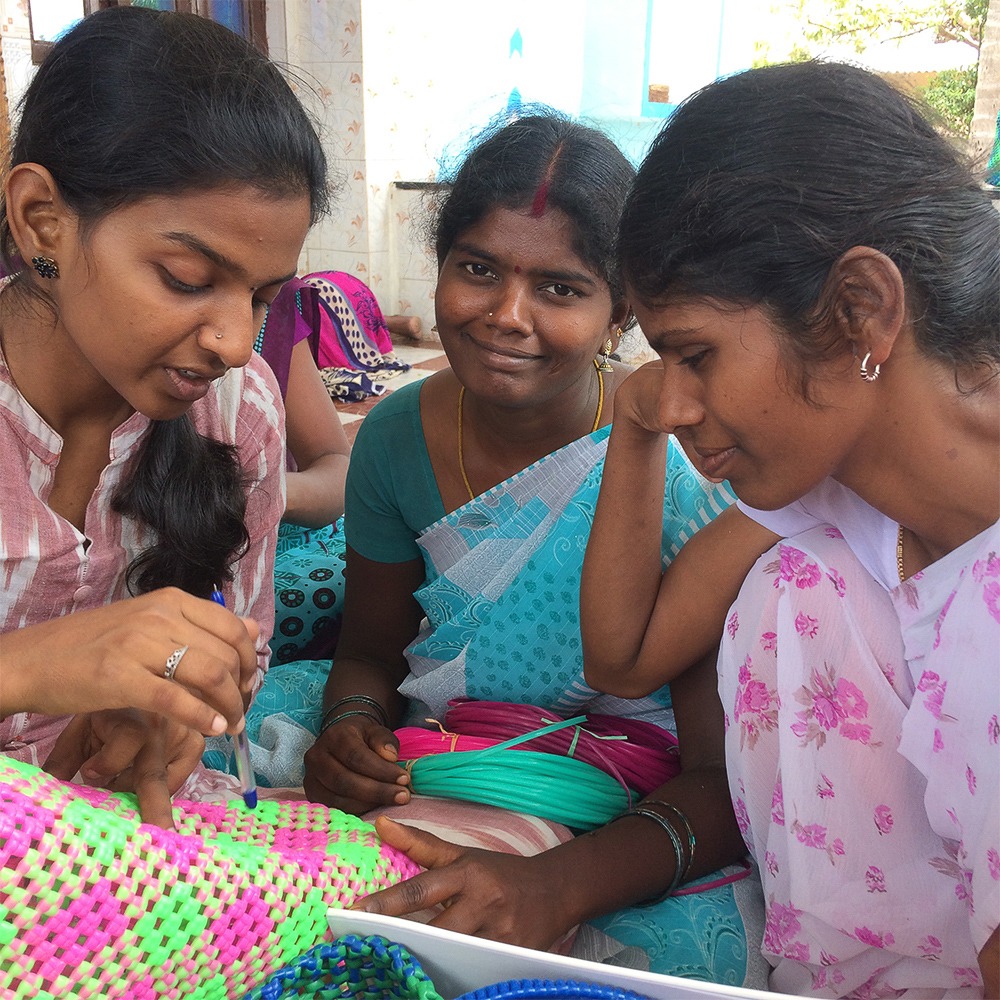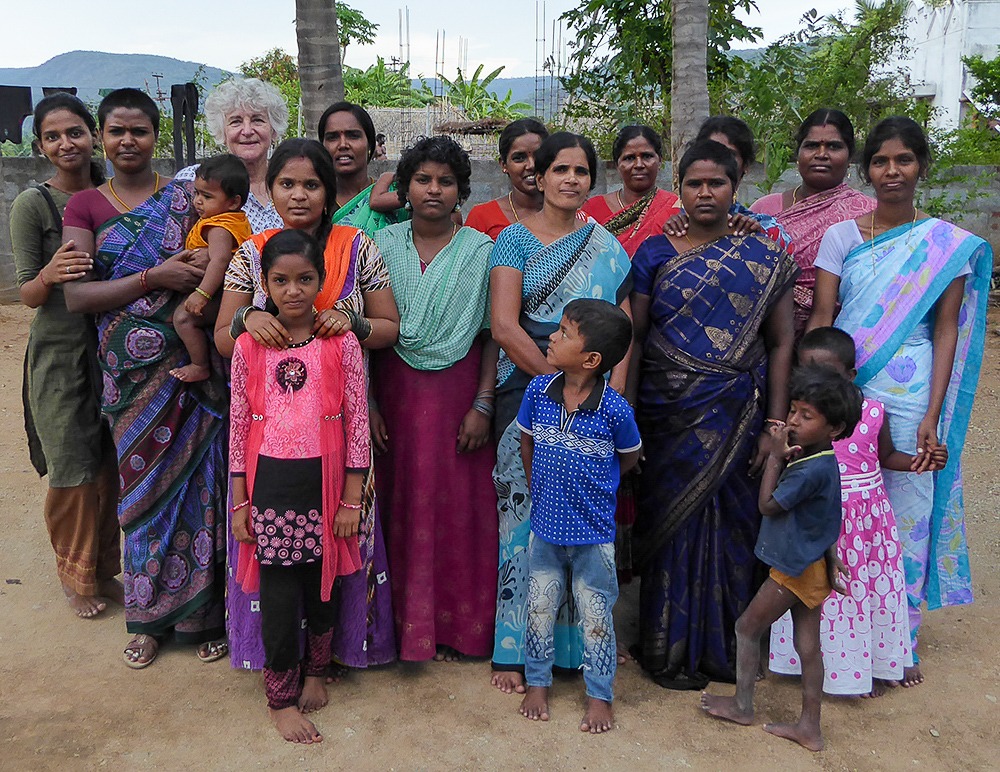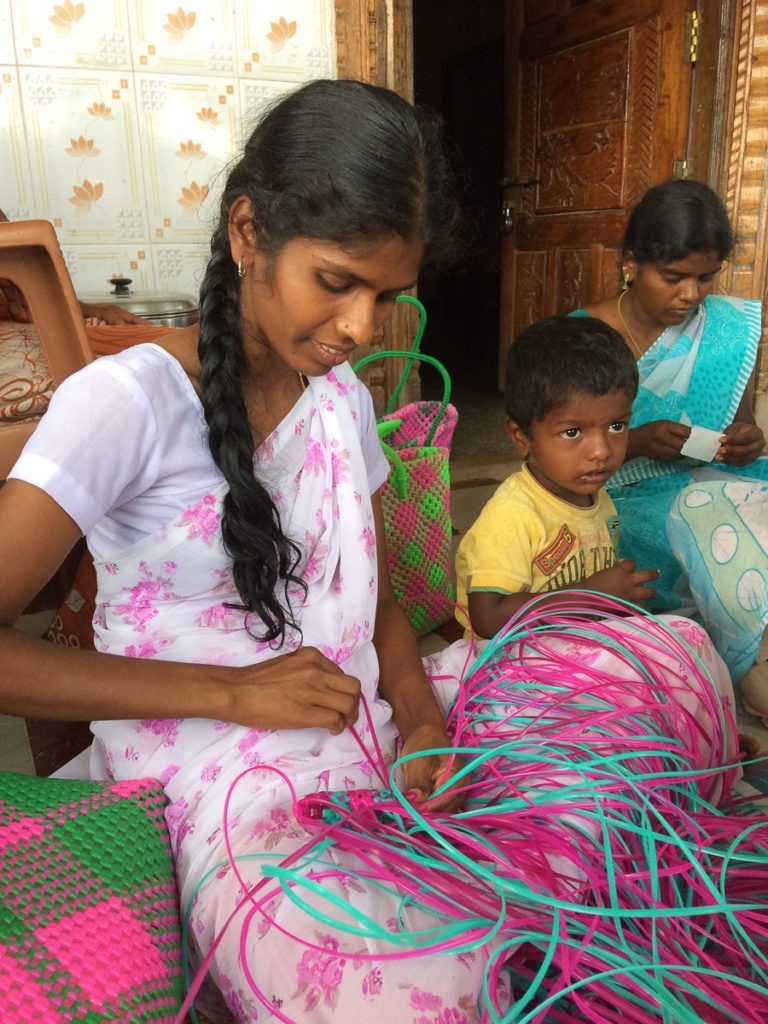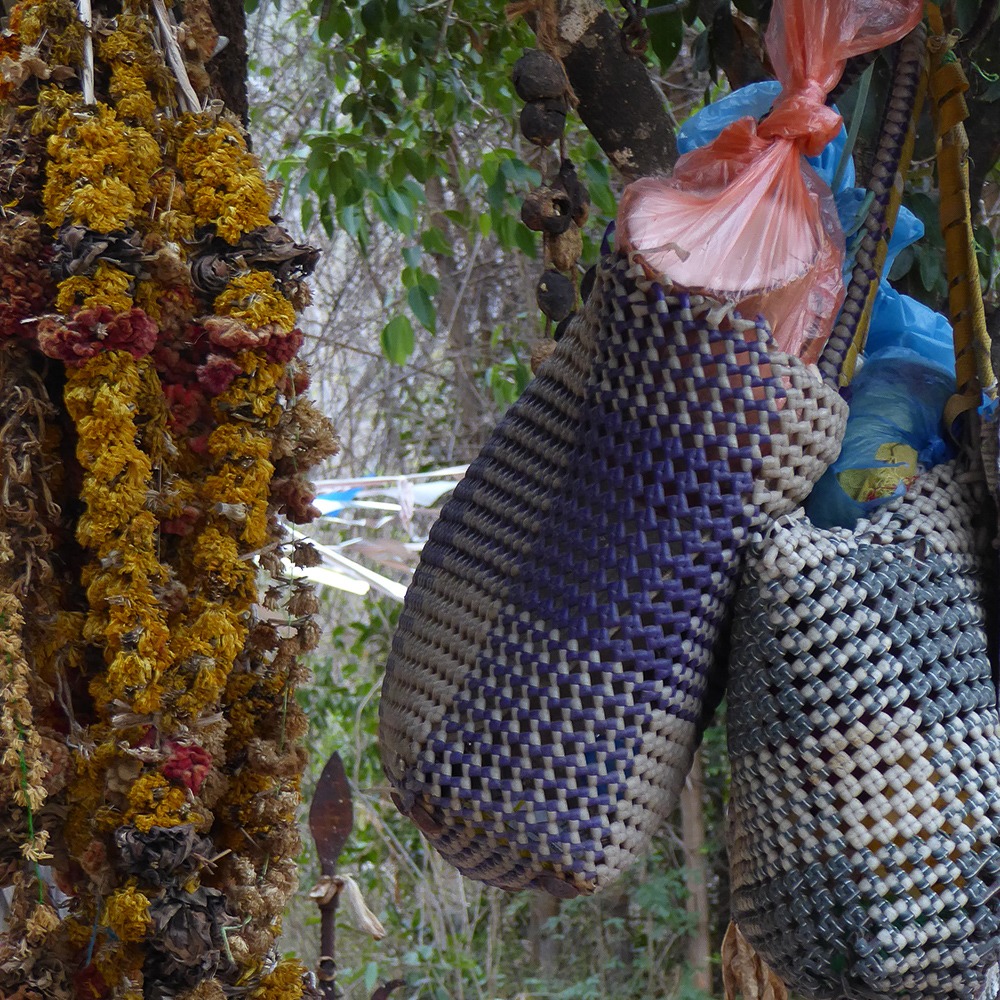- Gayathri, Roobini and Rajammal discussing colour and pattern. S. Dhadhampatti Tamil Nadu Photo- Julia Raath
- Angels Self Help Group, S. Dhadhampatti Tamil Nadu Photo Julia Raath
- Julia Raath – Anitha making a basket, Sittilingi Tamil Nadu Photo- Julia Raath
- Julia Raath – Rajammal starting a basket Photo Jullia Raath
- Baskets carried by locals, lunch box, water bottle hanging about at Sittilingi bus stop.Photo Julia Raath
- Made by Angels, Basket Collection, Photo Julia Raath
Julia Raath visits the Tamil Nadu village of Sittilingi and is inspired to help them bring vibrant colours to far away lands.
My mind was racing. So many colour combinations and bold patterns. So many questions. How sturdy are they? Can I put it on my bike rack and carry my books to work? They also look the perfect size for taking to the market! Which one should I choose? They both look fabulous!
I am standing at a market stall in Bangalore. A young man has a huge pile of brightly coloured baskets strewn in front of him and stacked behind him. I am struggling to decide which one to take home with me. The fluorescent orange, green and purple really appeals, but in the end, I choose a classic black and white check—besides I am going back to Melbourne!
That purchase changed my life.
When I returned to Melbourne I used my basket every day. I was stopped in the street and complimented on “What a great basket!” I love my basket. I became intrigued about who made them and where are they were made, what they were made from. I was to find out that these baskets are not just woven from plastic but woven from history. They each tell a story, their story.
It’s May three years later and I am at the train station in Chennai waiting to meet Gayathri Kannan. I had agreed to sponsor her Graduate Project in Textile Design at the National Institute of Fashion Design (NIFT). She is inspired by textiles and working with artisan groups. As she explained, “I have constant search for a purpose in life, which provides me with fruitful opportunities, the search for a satisfying career, where I can get benefits by serving and being productive”. We were off to Sittilingi in Tamil Nadu to meet the Angels Self Help Group, a group of women who make baskets.
We boarded the overnight train. I was excited and didn’t sleep a wink, keeping one eye open to make sure we didn’t miss the stop. We arrived at 4 am to be met by Mr Munishwaran who took us on a fast, hair-raising, 40-kilometre adventure of dodge the deepest pothole. We arrived, shaken to the bone, at the Tribal Initiative Hospital (THI) in Sittilingi. Gayathri, miraculously, slept the entire way.
Sittilingi is a small village located at the northwestern end of a long valley which is bordered by the Kalarayan Hill Forests in Tamil Nadu. Small farms of sugar cane, coconut palms, papaya, mangoes, tomatoes, eggplants, five different types of millets and leafy vegetables create a random patchwork pattern. Goats and chickens roam around freely but never far from home and cows are tethered to posts in houses that can afford them: the owners sell the milk to supplement their existence. Farmers’ houses are small with two or three rooms, made of mud-brick, with thatched roofs made from palm leaves. Some of the houses in the villages spread along the valley are brick or concrete and often brightly coloured, painted pink, purple, apple green or turquoise.
There are no supermarkets or shopping malls, just a few tiny stores set up in homes that sell soap, shampoo, biscuits, sugar, chips, tea, instant coffee, all in small sachets or packets. The local Sittilingi Organic Farmers Association (SOFA) sells locally-grown horse gram, tamarind, millet, coffee, millet biscuits and handmade soap to the locals and to stores in Chennai. For larger purchases like clothes, the locals need to travel by local bus to Salem, just under two hours away. Some enterprising women go there and buy children’s clothes or saris to sell from their homes.
Gayathri and I went to meet the basket makers in S. Dhadhampatti, the village at the end of the Sittilingi valley. The Angel Women’s Self Help Group of 14 women aged 18 to 42 are from a Tamil speaking Dalit group. They have built a strong community and wish to remain as a self-sustained village, independent of their neighbouring villages. Supported by Mr Munuswamy, Coordinator of SOFA, the self-help groups are formed in order to engage women in employment, which support the family’s needs. The men are the main income earners and the women do whatever they can, including seasonal farm work, planting or harvesting or casual construction labouring. The Angels started with the aim of working in a collaborative way using existing skills and sharing the workload, which allows the women to work from their homes whilst looking after their children. Basket making is a skill that many of these women learnt from a young age. They made baskets for friends or for an activity to undertake at home, often taught by their mothers or their grandmothers.
There are many villagers who use the baskets in their day-to-day life or carry their lunch box and water bottle to work. This style of handmade basket is becoming much harder to find in the market as poorer people choose to use free shopping baskets or very inexpensive imports from China. It takes approximately three days to make one basket, calculating the amount of each colour to make the patterns, measuring the wires then starting the process of knotting while sitting in a spaghetti-like tangle of coloured plastic.
On this first trip, I spent three days with the Angels. Together we created a brightly coloured collection of baskets, which eventually took over five months to complete. They were then packed and shipped off to Melbourne for sale.
Now, I am sitting here in my house in Melbourne wishing I was still there. I love the tranquillity of the valley, the slow days and the simple ways. Sitting with the women on the front porch of the Headmaster’s house, measuring plastic wires and deciding on colour combinations, listening to the women sing was a memorable experience. While I don’t speak the language, there is a shared understanding of what we are trying to do together. We laugh and smile at the simple things.
When I sell my baskets it delights me to share the story of the women who make them and what they have been able to do with the money they earn. I have many Indian people who come up to me at the markets, their eyes light up when they share stories of how they learnt to make these baskets as children and how they are part of their family history. These baskets last a lifetime, and carry a lifetime’s worth of memories.
I am indebted to my dearest friend Karthikeyan Balaraman who introduced me to my collaborator Gayathri Kannan. It was her constant search for a purpose in life, which brought me to the Angels who helped in answering all my questions. I love working with her and I love the Angels, each basket carries a story and the baskets tie us together.
Author
 Julia Raath lives in Melbourne, Australia, and offers small group tours to India, works with the Angel Women’s Self Help Group in Tamil Nadu who make baskets, designs and prints textiles, teaches print workshops and enjoys a full life. See www.surfaced.com.au.
Julia Raath lives in Melbourne, Australia, and offers small group tours to India, works with the Angel Women’s Self Help Group in Tamil Nadu who make baskets, designs and prints textiles, teaches print workshops and enjoys a full life. See www.surfaced.com.au.







